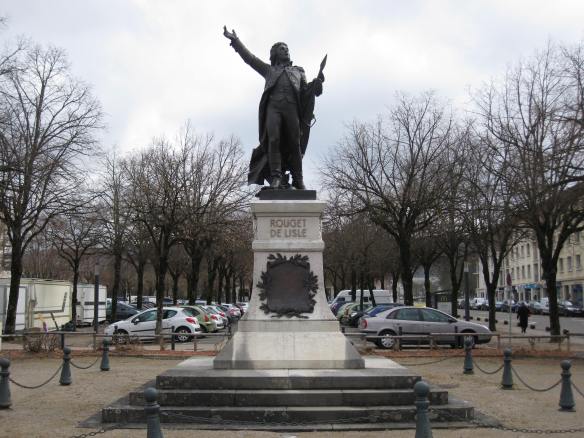This chapter is about the man in the above photo: Claude Joseph Rouget de Lisle. That statue above, in his hometown, was sculpted by the same person who did the Statue of Liberty. And, in my opinion, Rouget’s someone who should be equally celebrated as that monument.
He’s the man who wrote the one national anthem that’s known in every corner of the world; the one whose words are truly blood boiling; whose melody digs into you like the most addictive of drugs; the one that’s been stolen by practically every composer you can name. La Marseillaise.
What’s less known is about five minutes after writing it his life became a tragedy, a mix of porn, prisons and poverty – oh, and so many rows with Napoleon, the emperor disowned the song.
Rouget de Lisle wrote la Marseillaise in Strasbourg. He might have done it in this room which is today above a clothes shop:
But then he also might have written it in another room across town, whose owner – as this photo attests – very happily showed me around!
Neither house carries a plaque, partly because the council doesn’t want a legal fight with the rejected owner, and partly because the owners will be banned from doing anything to their property if they become historical monuments.
Anyway, this is meant to be an audio guide so I should get to the music! There are literally hundreds of videos of la Marseillaise on the net. There’s even one I made while traveling up and down the country which features some of the people interviewed, but here, since it’s the most well known outside France, is the Marseillaise scene from Casablanca:
You could fill several webpages with clips of music that quote la Marseillaise, but here are some excerpts of perhaps the most important.
First, two parts of Tchaikovsky’s 1812 Overture, a piece the composer thought was awful (“What do you see in it? The thing was written to order,” he told a friend). In it, la Marseillaise is meant to represent Napoleon’s forces trying, and then spectacularly failing, to invade Russia, which is a slightly bizarre choice given that Napoleon hated the song and so tried to make sure it wasn’t played.
That’s the two main Marseillaise sections from Antal Dorati’s great ‘bells and cannons’ 1958 recording, which you can hear freely all over YouTube, but I thoroughly recommend you buy now.
Jumping almost 100 years forward, here’s a bit of Serge Gainsbourg’s fantastic reggae cover Aux Armes et Caetera, which you should also pick up immediately:
And finally, here’s the Marseillaise intro to The Beatles’ All You Need is Love, which I assume you’re probably sick to death of so I’m not putting any links for!
Yes, I have used a WordPress music player for those excerpts rather than my usual Soundcloud ones. Yes, it is for copyright reasons! If you are the copyright owner and really want me to take them down, just say.
One thing I discuss perhaps less in this chapter than I should is whether Rouget actually wrote the song. Below is a piece by the Italian violinist, Giovan Battista Viotti written in 1781 – 11 years before Rouget de Lisle wrote his anthem. You only have to listen to it for a moment to hear the resemblance.
Even if he didn’t take it from there, he might have stolen it from this 1787 tune: Jean-Baptiste Grisons’ Oratorio d’Esther.
But the problem I have with calling Rouget a plagiarist is it takes away from his achievement. Even if he stole it, “just choosing that melody – knowing that it was the one to inspire – there’s art in that too” (to narcissistically quote my own book!). There’s more art in that than most songs you can name, in fact.
As much as this chapter’s about la Marseillaise, it also talks a lot about the anthems of France’s former colonies, especially Algeria’s seemingly anti-French Kassaman (We Pledge). Below is the first verse which talks about how the Algerian people are “determined that Algeria shall live [forever]”, independent from France. By the second verse it has people singing about using “gunpowder as our rhythm” and “machine guns as our melody”; while the third bluntly adds, “O France the day of reckoning is at hand.” It’s fascinating talking to Algerians about their views on both anthems (p22-25):
What’s going to happen to la Marseillaise in coming years, with all the ill feeling toward it, and a seemingly equal amount of ill feeling towards those who complain about it? How will the fallout from the Charlie Hebdo shooting affect those views (here’s France’s National Assembly singing it after the tragedy)? God knows!
While travelling around the country researching the anthem, I asked people what they thought of it and many suggested alternatives. Those included this which seemed such a ludicrous suggestion at the time I laughed, but listening to it again now, I don’t know. I’d probably go with it if I were French!



